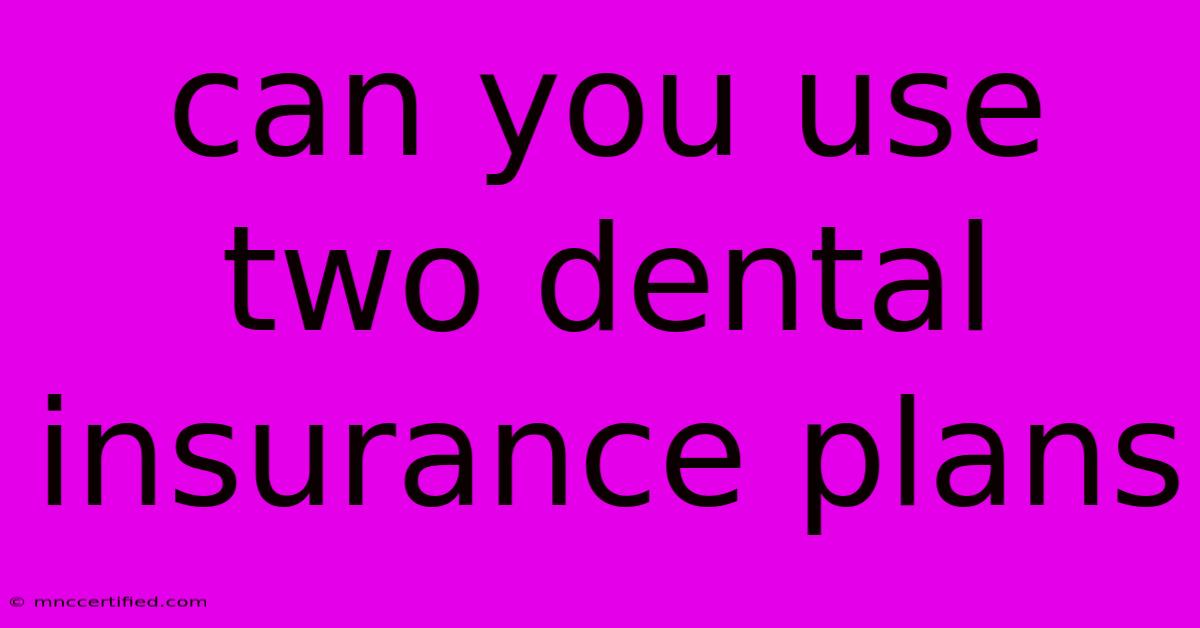Can You Use Two Dental Insurance Plans

Table of Contents
Can You Use Two Dental Insurance Plans? A Comprehensive Guide
Navigating the world of dental insurance can be confusing, especially when it comes to having multiple plans. You might be wondering: Can I use two dental insurance plans at the same time? The answer isn't always straightforward, but this guide will break down everything you need to know.
Understanding Dental Insurance Coverage
Before diving into the two-plan scenario, it's important to understand how dental insurance typically works:
- Annual Maximum: Most plans have a limit on the amount they'll cover in a year.
- Deductible: This is the amount you pay out-of-pocket before your insurance kicks in.
- Co-insurance: After you've met your deductible, you typically share a percentage of the remaining cost with your insurer.
- Waiting Periods: Some procedures, like crowns or implants, might have waiting periods before you can use your insurance.
Can I Use Two Plans Simultaneously?
The short answer is sometimes, but it's not a common practice. Here's why:
- Plan Restrictions: Most dental insurance policies explicitly prohibit using another plan concurrently. They usually have clauses stating that coverage is primary if you have one plan and secondary if you have another.
- Coordination of Benefits: This is a rule that dictates how multiple insurance plans work together to avoid double coverage. Usually, the primary plan will pay first, and the secondary plan will cover the remaining costs, up to its annual maximum.
However, there are situations where using two plans might be possible:
- Spouse or Dependent Coverage: If you're covered under two plans, one through your employer and another through your spouse's employer, you may be able to use both. However, this typically only applies to the plan covering you as the primary member, not the secondary member.
- Specific Procedures: In some cases, you might use one plan for preventative care (cleanings, checkups) and another for more expensive procedures (crowns, implants). This is usually determined by the benefits offered by each plan and whether the plans allow for coordination of benefits.
How to Determine if You Can Use Two Plans
The best way to find out is to contact your insurance providers directly.
- Review Your Plan Documents: Carefully read through the fine print of each policy to identify any clauses regarding using multiple plans.
- Speak to a Representative: Call your insurance provider's customer service line and ask specifically about using two plans. They can give you the most accurate information regarding your specific situation.
What to Consider When Using Two Plans
- Coordination of Benefits: Ensure you understand how the two plans interact to avoid double-paying for procedures.
- Deductibles and Maximums: Be aware of each plan's deductible and annual maximum to estimate your out-of-pocket costs.
- Waiting Periods: Keep track of any waiting periods for specific procedures and plan accordingly.
Conclusion
Using two dental insurance plans can be a complex situation, and the feasibility depends on various factors like plan restrictions and coordination of benefits. Always seek clarification from your insurance providers to understand your coverage options and avoid any unexpected costs.

Thank you for visiting our website wich cover about Can You Use Two Dental Insurance Plans. We hope the information provided has been useful to you. Feel free to contact us if you have any questions or need further assistance. See you next time and dont miss to bookmark.
Featured Posts
-
Contingent Cargo Insurance For Brokers
Nov 09, 2024
-
Lord Mayors Show Monday Vs Saturday History
Nov 09, 2024
-
Are Punctal Plugs Covered By Insurance
Nov 09, 2024
-
Non Resident Insurance License Florida
Nov 09, 2024
-
What To Know About Seed To Tables Views
Nov 09, 2024